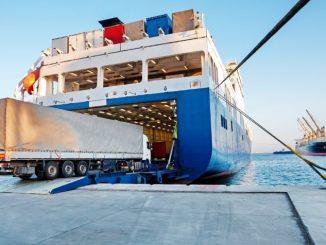
A range of the logistics sector’s leading operators have told MT that although Brexit has presented them with major challenges, the situation is now starting to improve.
Questioned in our latest panel debate, most said they were successfully tackling customs changes triggered by the UK’s departure from the EU, but that movement of goods into and out of Ireland remained a key issue.
“The situation has eased considerably on our daily movements into both sides of the Irish Sea,” said Aztek Logistics MD Stuart Charter. “The complexity of the situation thwarted a seamless transition in the wake of the existential Irish border question and special protocols – an issue freighted with economic, security and political uncertainty.
“However, we published a Brexit administrative essentials checklist on our website and created a visual guide to display specific information on subjects including EORI notes, commodity codes, declarations, commercial invoicing, packing lists, certificates and licences and tariffs. None of this material was obvious to businesses looking on the GOV.UK website so we created a visual step-by-step representation.
“We are also investing additional customs clearance training for our staff and engaging apprentices to take on this role.”
Charter said some firms had stopped shipments until the situation was resolved, with one courier company complaining that more than 70% of parcels were accompanied with incorrect paperwork.
He also stressed that businesses dealing with Irish customers now also needed to ensure shipments only travel on heat-treated pallets as the UK falls outside of an EU-wide exemption to this rule.
Read more
- Brexit ‘abyss’ looms for GB-Northern Ireland trade
- Renegotiate Brexit terms with EU or face collapse of Northern Ireland trade, government warned
- Over two thirds of logistics firms predict Brexit will harm their business, Logistics UK report reveals
ArrowXL MD Charlie Shiels agreed that the Irish situation is “very much improving”.
“We’ve got better and so have our clients and the authorities,” he explained. “We’ve also employed an import-export expert who is doing an amazing job. The next step is Northern Ireland compliance which has been moved back to October.
“We deliver into both northern and southern Ireland and our Brexit project was split into three; firstly our people and the impact on them. Secondly, operational compliance. Thirdly, any other legal/contractual/regulatory compliance issues like data protection, procurement, client contracts etc.
“Project two took most of the work and involved becoming import/export educated and re-engineering the way we worked to ensure compliant and significant IT work/investment on import/export rules.
“We also sourced customs clearance partners, educated clients on the new rules, provided internal training and implemented a new operational solution.
“We’ve seen delays, some of our own making, but the relevant authorities seemed a bit overwhelmed at the new rules and it was a struggle for a period. But we were pleased at our January/February operational success/compliance and delays were relatively minimal."
Dan Myers, XPO MD UK and Ireland, admitted Brexit had presented challenges but that it had worked together with its customers to ensure trade had continued. “Further investment in our people and systems has improved the ease at which goods now flow,” he said. “We are helping new customers navigate this landscape and we will scale our solution, helping more businesses continue their trade with their European partners.”
However, Meachers chairman Bob Terris told MT that it had not yet resolved significant Brexit challenges: “Arranging movements is very difficult at the moment with each transaction taking much longer to organise,” he admitted. “We are also heavily involved in the importing of Covid-related requirements. Shipping lines are unable to give firm rates or commit to bookings in many cases. There are no signs of any improvement and I would guess this will carry on to the end of the year.”
Meanwhile, Cullimore MD Moreton Cullimore said that although the company didn’t export or do a large amount of continental haulage, the biggest effect of Brexit was “the protracted uncertainty and political unrest of the four years leading up to the final exit date”.
“For us it stalled local economies that had only just recovered from the previous recession. With the result of the 2019 election we saw a sharp increase in work as 2020 began and a lot on our forward order book which had just been put off in the years previous. So far, for us, the effects of post Brexit have been non-existent compared to the effect of Covid -19.”













